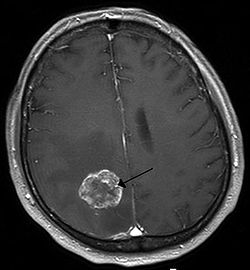Brain metastasis
This article has multiple issues. Please help improve it or discuss these issues on the talk page. (Learn how and when to remove these messages)
|


A brain metastasis is a cancer that has metastasized (spread) to the brain from another location in the body.[1] As primary cancer treatments such as surgery, radiation therapy and chemotherapy have become more effective in the past few decades, people with cancer are living longer after initial treatment than ever before. However, brain metastases still occur in many patients months or even years after their original cancer treatment. Brain metastases have a poor prognosis for cure, but modern treatments are allowing patients to live months and sometimes years after the diagnosis.[2]
Symptoms
Often, patients have no obvious symptoms to alert them that their cancer has spread to the brain. Follow-up doctor visits and brain scans may be needed to determine the presence of brain metastases.[3]
Brain metastases can cause a wide variety of symptoms, many of which are also present in minor, more common conditions. They include:
- Vertigo
- New onset headaches
- Cognitive, personality, and behavioral changes.
- Nausea and vomiting
- Memory loss
- Increased intracranial pressure
- Paraesthesias
- Vision disorder
- Bells palsy
- Ataxia
- Seizures
Causes
The most common sources of brain metastases in a case series of 2,700 patients undergoing treatment at the Memorial Sloan–Kettering Cancer Center were:
- Lung cancer, 48%
- Breast cancer, 15%
- Genitourinary tract cancers, 11%
- Osteosarcoma, 10%
- Melanoma, 9%
- Head and neck cancer, 6%
- Neuroblastoma, 5%
- Gastrointestinal cancers, especially colorectal and pancreatic carcinoma, 3%
- Lymphoma, 1%
Treatment
Treatment for brain metastases is primarily palliative, with the goals of therapy being reduction of symptoms and prolongation of life. However, in some patients, particularly younger, healthier patients, aggressive therapy consisting of open craniotomy with maximal excision, aggressive chemotherapy, and radiosurgical intervention (gamma knife radiosurgery) may be attempted.
Symptomatic care
Symptomatic care should be given to all patients with brain metastases, as they often cause severe, debilitating symptoms. Treatment consists mainly of:
- Corticosteroids - Corticosteroid therapy is essential for all patients with brain metastases, as it prevents development of cerebral edema (swelling of the brain tissue), as well as treating other neurological symptoms such as headaches, cognitive dysfunction, and emesis. Dexamethasone is the corticosteroid of choice.
- Anticonvulsants - Anticonvulsants should be used in all of the 30-40% of patients with brain metastases who experience seizures, as there is a risk of status epilepticus and death, as is the case with other patients with possibly severe seizure types (particularly generalized tonic- clonic, or grand mal, seizures, where the entire brain, not just one local focus or lobe, is pathologically affected). Phenytoin is the most commonly used drug in this setting, but valproic acid and other anticonvulsants can also be used; newer anticonvulsants generally have the advantage of fewer toxic side effects.
Radiotherapy
Radiotherapy plays a critical role in the treatment of brain metastases, and includes whole-brain irradiation, fractionated radiotherapy, and radiosurgery. For decades, whole brain irradiation has been advocated for patients with multiple lesions, a life expectancy of less than three months, or a low Karnofsky performance score, and it does appear at least somewhat effective. However, it often causes severe side effects, including radiation necrosis, dementia, toxic leukoencephalopathy, partial to complete hair loss, nausea, headaches, and otitis media. In children this treatment may cause mental retardation, psychiatric disturbances, and other neuropsychiatric effects.[4]
Surgery
Brain metastases are often managed surgically, with maximum surgical resection followed by stereotactic radiosurgery or whole-brain irradiation delivering superior survival compared to whole brain irradiation alone. Therefore, in patients with one metastatic brain lesion, limited, absent, or controlled systemic disease, a life expectancy of at least 3 months and good performance status might be expected.[5]
Stereotactic Radiosurgery
Stereotactic radiosurgery is being increasingly utilized for the treatment of a limited number of brain metastases. Stereotactic radiosurgery alone or with whole brain radiation therapy has been shown to achieve excellent local tumor control. Addition of stereotactic radiosurgery to whole brain radiation can increase the control rate and functional status of patients.[6]
Chemotherapy
Chemotherapy is rarely used for the treatment of brain metastases, as chemotherapeutic agents penetrate the blood brain barrier poorly.[1] However, some cancers such as lymphomas, small cell lung carcinomas and breast cancer are highly chemosensitive and chemotherapy may be used to treat extracranial sites of metastatic disease in these cancers.[1] An experimental treatment for brain metastases is intrathecal chemotherapy, a technique in which a chemotherapeutic drug is delivered via intralumbar injection into the cerebrospinal fluid. However, it is not approved by the U.S. Food and Drug Administration (FDA) for the treatment of brain metastases.[citation needed]
Prognosis
The prognosis for brain metastases is variable. It depends on the type of primary cancer, the age of the patient, the absence or presence of extracranial metastases, and the number of metastatic sites in the brain. For all patients combined, median survival is only 2.3 months. However, in some patients, such as those with no extracranial metastases, those who are younger than 65, and those with a single site of metastasis in the brain only, prognosis is much better, with median survival rates of up to 13.5 months.[1]
See also
References
- ^ a b c d Tse, Victor (10 November 2009). "Brain Metastasis". Medscape. Retrieved 13 January 2010.
- ^ http://www.rtanswers.com/treatmentinformation/cancertypes/brainmets/index.aspx
- ^ http://www.rtanswers.com/treatmentinformation/cancertypes/brainmets/signs.aspx
- ^ http://www.astro.org/PressRoom/PressKit/AnnualMeeting/documents/Movsas.pdf
- ^ http://emedicine.net
- ^ Whole brain radiation therapy (WBRT) alone versus WBRT and radiosurgery for the treatment of brain metastases. Patil CG, Pricola K, Garg SK, Bryant A, Black KL. Cochrane Database Syst Rev. 2010 Jun 16;(6):CD006121. Review. PMID 20556764
